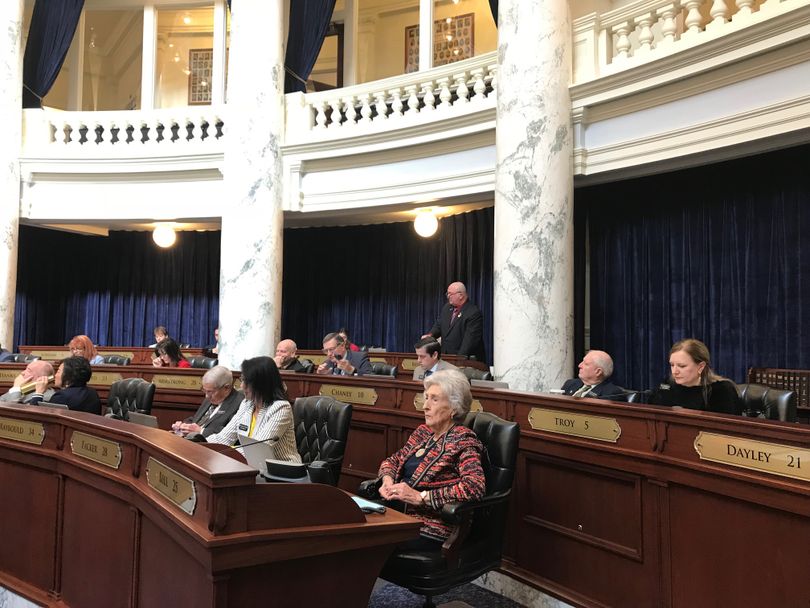House passes anti-Sharia law bill, 44-24

The House has voted 44-24 in favor of HB 419, Rep. Eric Redman’s anti-Sharia law bill, which seeks to forbid the recognition of any foreign law by Idaho courts; you can read my full story here at spokesman.com. Here's the full vote breakdown:
Voting in favor: Reps. Anderst, Armstrong, Barbieri, Blanksma, Boyle, Chaney, Cheatham, Collins, Crane, Dayley, DeMordaunt, Dixon, Ehardt, Gestrin, Giddings, Hanks, Harris, Hartgen, Holtzclaw, Horman, Kerby, Kingsley, Loertscher, Luker, McDonald, Mendive, Monks, Moon, Moyle, Nate, Packer, Palmer, Perry, Raybould, Redman, Scott, Shepherd, Syme, Thompson, VanderWoude, Wagoner, Youngblood, Zito, and Zollinger.
Voting against: Reps. Amador, Anderson, Bell, Burtenshaw, Chew, Clow, Erpelding, Gannon, Gibbs, Kauffman, King, Kloc(Tway), Malek(Patano), Manwaring, McCrostie, Miller, Rubel, Smith, Stevenson, Toone, Troy, VanOrden, Wintrow, and Bedke.
As he has before, Redman read large portions of his opening debate word-for-word from the American Public Policy Alliance’s “American Laws for American Courts” website.
The bill follows model legislation developed by the group, which is headed by Louisiana attorney Stephen Gele; it promotes the concept to states, and has gotten it passed in several. A 2010 Oklahoma constitutional amendment forbidding that state’s courts from considering Sharia in decisions was overturned in federal court in 2013. Redman’s version, like the most recent model legislation, doesn’t specifically mention Sharia, to avoid that constitutional problem, but it’s the most frequent example he and others use to explain why they feel it’s needed.
Redman told the House that while no Idaho judge has made a decision based on foreign laws, it could happen. “We dare not wait to install the smoke detector after the fire,” he said, adding that there have been “multiple instances” in other states in which judges based their rulings on foreign laws.
When House Minority Leader Mat Erpelding, D-Boise, asked Redman for an example, he cited a New Jersey case in which he said a judge refused to grant an abused wife a protection order because, following testimony from the husband’s imam, he ruled that the husband was merely acting according to his religious beliefs that he had a religious right to have sex with his wife whenever he wanted.
Erpelding asked, “Was this upheld in appellate court or Supreme Court, or was it overturned?”
Redman responded, “I honestly can’t tell you that for sure.”
Later in the debate, Erpelding said he’d found the case in question. “The case that is constantly presented in this case was remanded back to the court by the New Jersey Superior Court,” Erpelding said. “They said, ‘We are satisfied the judge was mistaken in deciding not to issue a restraining order.’ … So this woman was protected. My point is that judges make mistakes. I am super doubtful that this thing would protect us from judges making mistakes. In this case and all the cases listed, they were remanded back to the lower court and they were overturned.”
Redman said 13 states including Washington have adopted such laws since 2010, “and there have been no negative effects to foreign commerce, adoptions or religious freedoms.”
Washington’s law, enacted in 2015, is a two-paragraph clause in that state’s 38-page Uniform Interstate Family Support Act, appearing on the next-to-last page, after numerous other sections specifying when foreign court orders do apply in child custody and support cases. It says, “Washington’s courts, administrative agencies, or any other Washington tribunal shall not recognize, base any ruling on, or enforce any order issued under foreign law, or by a foreign legal system, that is manifestly incompatible with public policy.”
Rep. Vito Barbieri, R-Dalton Gardens, told the House, “The thrust of this bill is to recognize that there are religious foundations in civil law. The particular complaint we have here is that this focuses on Sharia. Sharia may have a religious foundation, but it is a civil code, a civil process, and that civil process is in direct contravention to Amercian jurisprudence … and the foundations of American civil law.” Barbieri said, “These two conflict.”
Rep. Caroline Nilsson Troy, R-Genesee, said, “While I agree completely with the concerns that the good gentleman has, that we don’t want foreign law recognized in our Idaho courts, our judges swear to uphold the Constitution of the United States and our laws.” She added, “I live with a judge during session, and I would never question her integrity in this way, and I would hope she would not question the integrity of the Legislature in this way. We’re the ones that probably could make the laws that would impose Sharia law in the state, and I can’t imagine that ever happening, and I can’t imagine our judges allowing that to happen either, so I’m going to vote against this bill.”
Redman said in his closing debate, “This body makes the laws and our judicial system interprets them. This is a bill, a statute that’s gone thru 13 different states, and I repeat, even our neighbor Washington state, and the whole purpose of it is that we will not have any foreign law defile our constitutional laws. I urge you to vote for this to protect our state and our country. Thank you.”
Today’s vote sends the bill to the Senate side. To become law, it would need to clear a Senate committee, pass the Senate, and receive the governor's signature.
